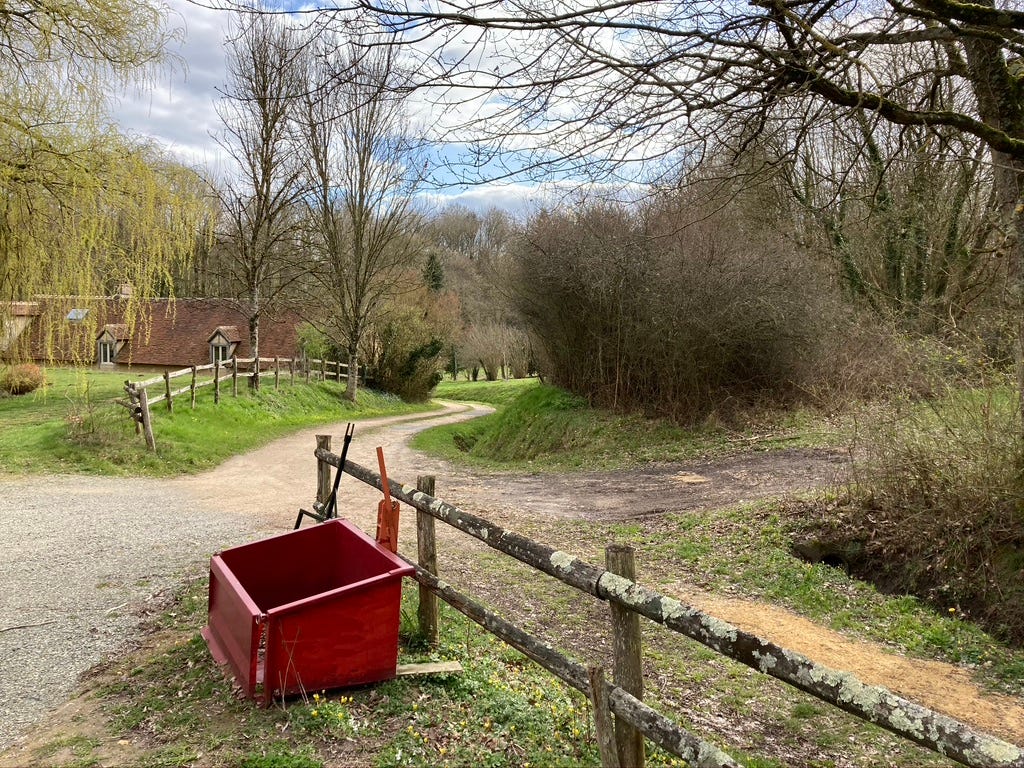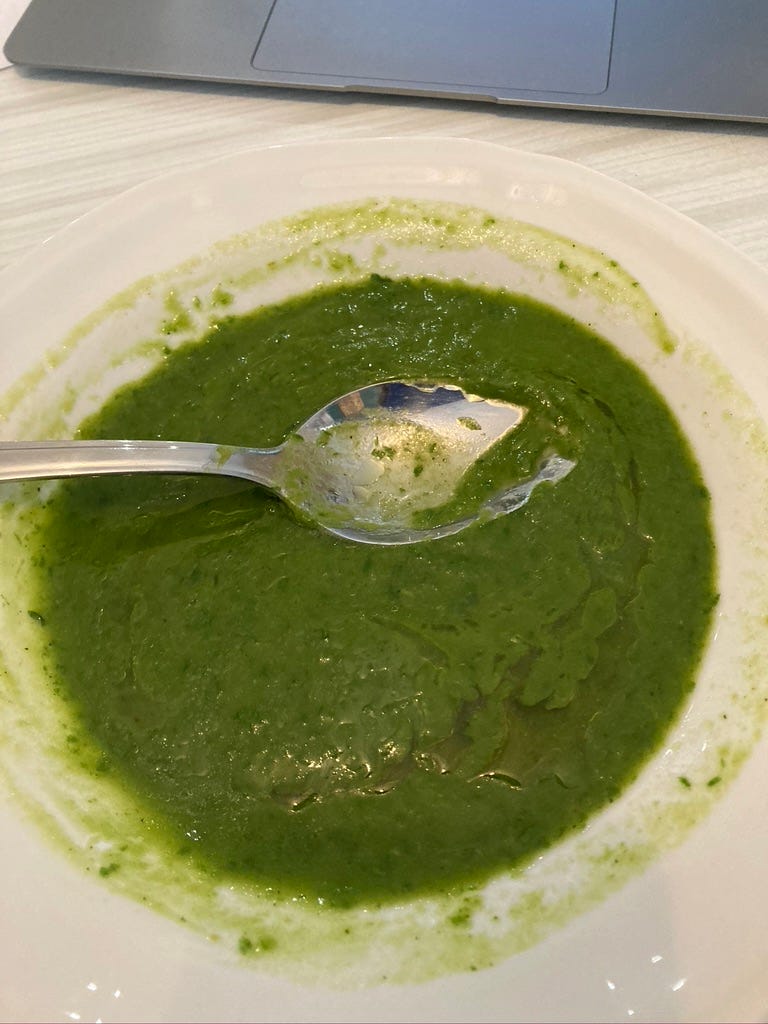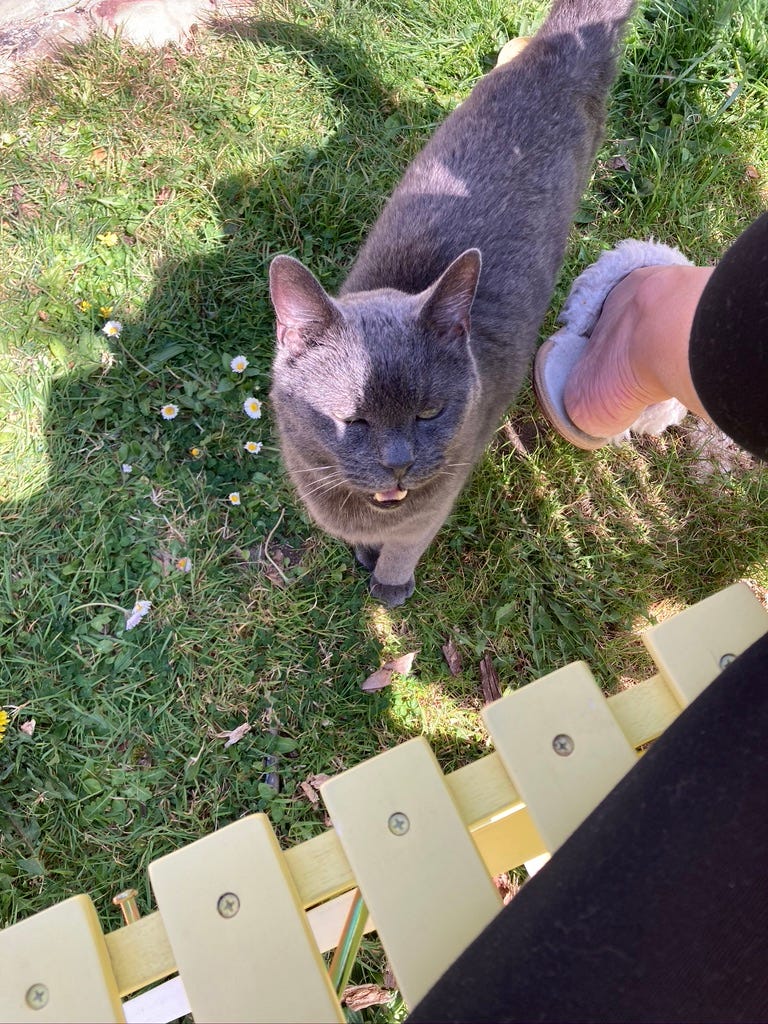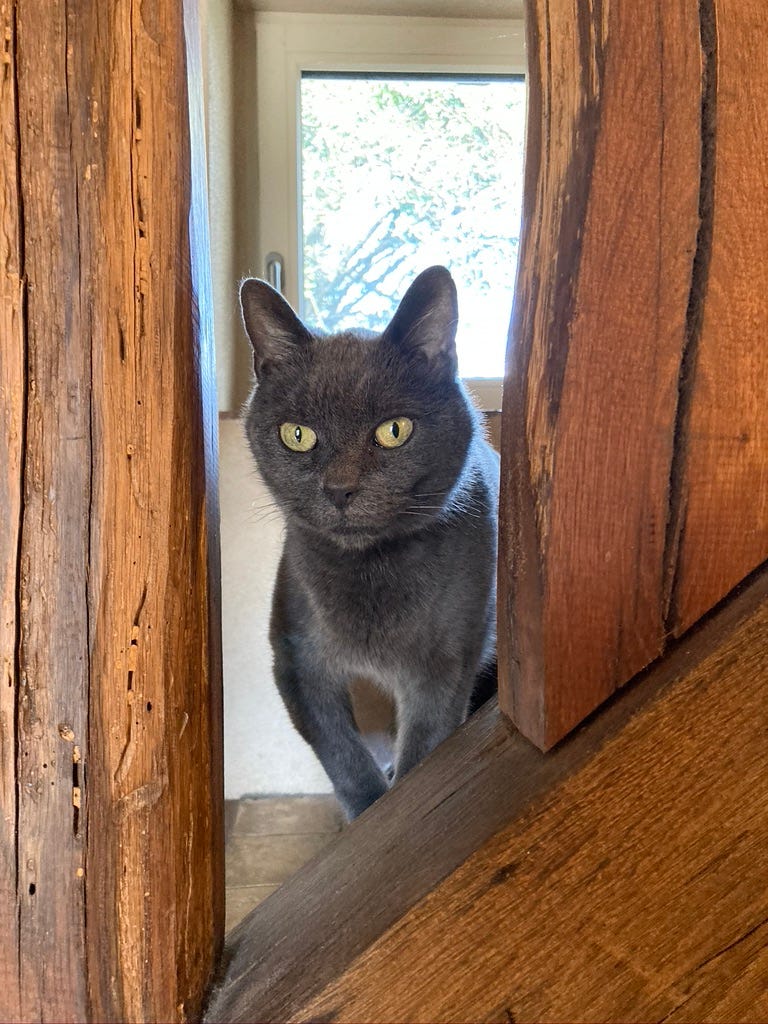Chapter Sixteen: Who Are the People in Your Neighborhood?
I was about to find out. (Please sing along with Bob McGrath.)
Before we begin, some housekeeping:
Last week unexpected travel and general brain drain made for a week off. Thank you for your patience. Also, as these posts have started to accumulate, and for new readers who are joining (hi and welcome!), the serialized nature of (most of) what’s written here is less evident. So I have added actual chapter numbers. Read them in order if you’re just hopping on this narrative bus.
Thank you for your patience. On with the show.
A month-ish had gone by at the mill house, and I finally had the inner juice to accept one of Samira’s invitations to attend one of the lunch parties she threw semi-regularly.
I assume most of you are up on the introvert/extrovert discourse. I am very much one of the former. I find the presence of most other people, even those for whom I would walk over hot coals and die, to be draining after too short a time. Refilling my sanity tank requires solitude. Also, though I am not shy to argue political and aesthetic opinions into the ground, when it comes to personal business, I’m hyper-aware of other people’s emotions, and have a people-pleasing instinct, which means I often compromise with others without knowing I’m doing it. Compromise is the key to life but too much of it, or at the wrong time, can make you resentful and cranky. It took me years to learn this about myself, and to be more vocal and conscious of boundaries, but the realization also made me even more compulsively independent.
Solitude is not always paradise, but with it at least I know I can make my own small, situational choices without any outside input, and don’t have to converse when my brain is most likely unpicking some other knot somewhere in a more distant part of its lobe. I can go days and days without having a real-time conversation with another person, or leaving the house, without the faintest glimmer of cabin craziness. Whether in email, on social media or in texts, the large majority of my communication with others is written.
That’s me under normal circumstances. In the immediate post-breakup period, which was compounded by the pandemic, even before I put my life into a Cuisinart and hit pulse, I had already slid into something close to social anxiety back in Paris.
The sun coming out in Le Perche made for a break, both outside and in. But it was delicate, and it came in fits and starts. I was happy that I wanted to know about who else was out there, because I knew I was going to need to make new friends. But the idea of taking on a whole table of like ten strangers at once gave me the yips. Even if I was progressively less wan and weepy, I had become crusty, rough around the edges, and less able to make small talk. I spooked at even small emotions. I had lost my game and imagined any first impression I gave would need to be corrected later.
I rolled out of my front door around noon to see if Samira needed any help, and found picnic tables on the terrace outside her kitchen door covered with bright tablecloths, jelly jars of daffodils and nosegays of wildflowers. Samira wore a flower crown herself, woven from the same stuff on the tables. Claude was bringing out cider and bottles of wine and waved hello. “Go try the nettle soup and tell me what you think!” Samira called out to me. She had offered me the use of the main house kitchen enough times that I knew where it was. Filled with plastic to-go tubs of spices and herbs, with rudimentary appliances, I had to admire how often she put it to work.
I know no other way to say this, but her cooking was not great. Sorry, we are in a space of ruthless honestly, so I will not gild the lily. The nettle soup was watery and bitter and needed cream and butter and nutmeg. (I could say the same thing about myself, TBF.) Samira was very proud to cook healthily, and always announced how she used soy milk instead of cream or whatever, so I just told her it might need a touch more salt, but it was clearly full of nutrition. She glowed and started to tell me just how much. It turns out those plants that sting the shit out of you if you brush your exposed skin against them are a superfood.
Observation: not everything good has to be easy to handle.
Her friends arrived one by one. They were a curious mix—not “curious,” like a withering euphemism for “weird,” but “curious,” meaning, they made me curious. There were a couple of builders, a profession that rules Le Perche and all its country house turnover with the iron fist of scarcity and slow pace. Living in the city, one adulates billionaires and tech gurus and CEOs and famous artists, so this was a different frame. There was a strapping rancher/butcher with a mohawk dressed in a man-kilt, and his gorgeous hippie girlfriend. There was a Persian woman a few years older than me wearing Yohji Yamamoto pants and an angular short haircut. She had the look of an art gallerist. Her husband, some years older than her, was elfin, in a fluffy cashmere scarf, with spiderlike, delicate hands. None of them seemed to have anything visibly in common with Claude and Samira and yet here they were, and it clearly wasn’t the first time.
I started chatting with Yohji pants, as she was the most familiar-feeling, and she was calm and had soulful eyes. It turned out she was a big deal architect and weekender. She was clearly very intelligent, but the flat-tire vibe of depression hung around her. I was just starting to claw my way out of it myself, so our alkaline-alkaline combo didn’t make for the fizziest conversation. Then a couple of apple-cheeked grandparents rolled up, a little late, in plaid shirts, bearing homemade Calvados.
From the minute they opened their mouths, it was love. They were cheeky and irreverent and as we were milling around eating carrot sticks and overly curried hummus, they kept me plied with cider. (Cider is a thing in Le Perche.) Georges had retired from a lifetime of woodworking and antiques dealing, and Geneviève used to work for the regional government, approving building permits. They were both generations-deep percherons, from a village about 20 minutes away, and knew where all the bodies were buried. Georges had made some gorgeous oak cabinets around the mill house and was clearly serious about his work, which was done in the old way, and quite fine.
With the builders, Georges went on about the diminished quality of wood in the local forests now that they’re geared towards high turnover logging, and I saw that he could get intensely worked up but keep his smile. His all-around affect reminded me of one of my mother’s mentors, a twinkly Swiss grandpa with a Santa beard named André. André did the same thing as Georges for a living, and when I was five, he hired my mother to help out at his very high end Beverly Hills antiques shop. Though I deeply resented her working (kids want everything the way they want it), I loved the smell of wood wax and the gleam of all the copper when she brought us to the shop. André used to do magic tricks—oops! he got my nose—and hand out little tastes of cheese. He was surrounded by the most rarefied beauty yet he was as down to earth as the dirt itself.
Though I favored Georges and Geneviève that day, I managed to talk to almost everyone at the lunch. I partially credited the flow of cider, and partly a sort of latent anthropologist urge, but I was proud of myself all the same. The rancher was going to lend Samira and Claude a cow so they could stop mowing their fields, the architect invited me to come around her place to see her husband’s paintings. After everyone had gone, the last of Georges’ very good homemade Calvados still warming our bellies, I told Samira that I would love to see Georges and Geneviève again. She clapped her hands and smiled, and told me we’d make a plan soon.
The sunnier days also meant Fred and Penelope’s coming out. They were always indoor cats. The Paris house had a walled garden they were free to roam but Freddy mostly just used the dirt for an extended litterbox. Now I wanted to see if nature without dangerous, sooty five-lane traffic might work its magic on them too.
I started leaving the door open and letting them wander off more or less within eyeshot. They rolled around in the grass and sniffed Fifi’s traces and it all seemed like hey, the country is where it’s at for everyone. And then one night as it was getting darker, neither Penelope nor Fred were anywhere to be found. I told Samira, who lit a five-alarm fire. She and Claude dropped everything and the three of us spread out to cover the land around the house. I was panicked.
Samira found Freddy. He was at the mouth of the forest where I started hugging trees. Now it was getting dark. He had his back to the woods, facing Samira, and alternately hissed and howled. I swept him into my arms, told him everything was OK, covered him with kisses and put him into the house. He was never the toughest guy. Penelope seemed to be really gone, though. I panicked again, Samira said no, no, she’s an animal in nature, this is part of her spirit, it’s the call of the wild. I believed none of this, was convinced she’d be eaten by a screech owl, but left a window open downstairs overnight and prayed Freddy wouldn’t go back out.
At 4 am I heard noises downstairs, and in the beam of my phone flashlight, I saw Penelope’s eyes flash. She had a large rodent in her mouth. Fucking hell. I went back upstairs and figured we’d handle whatever carnage was left in the morning. I put the covers over my head, took a large sleeping pill and listened to them batter the thing into paralysis for the next hour.
The whole time those two glorified teddy bears lived in Paris we had mice and Freddy only once got off his ass to hunt. The minute we saw him prance into the kitchen with a live mouse in his mouth, he dropped the booty and it ran back into its hole. So things had really changed. I guess Samira was right.










I couldn't have loved this more. The way you described the folks who came over for healthy green soup... well it felt like they were all coming and going into my own kitchen. I can't decide if I would love it there or be researching new areas in which to call home. Thank you so much, you've made my day.